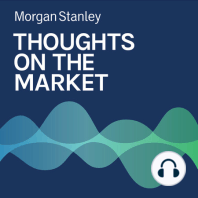3 min listen

U.S. Economy: Tracking Rate Hike Implications
U.S. Economy: Tracking Rate Hike Implications
ratings:
Length:
11 minutes
Released:
Mar 25, 2022
Format:
Podcast episode
Description
The new Fed hiking cycle has begun and with it comes expectations for faster rate hikes and quantitative tightening to address inflation, as well as questions around how and when the U.S. economy will be affected. Chief U.S. Economist Ellen Zentner and Senior U.S. Economist Robert Rosener discuss.-----Transcript-----Ellen Zentner: Welcome to Thoughts on the Market. I'm Ellen Zentner, Chief U.S. Economist for Morgan Stanley Research. Robert Rosener: And I'm Robert Rosner, Morgan Stanley's Senior U.S. Economist. Ellen Zentner: On this episode of the podcast, we'll be talking about the outlook for the U.S. economy as the Fed begins a new rate hike cycle. It's Friday, March 25th at 9:00 a.m. in New York. Ellen Zentner: So Robert, last week the U.S. Federal Reserve raised the federal funds rate a quarter of a percentage point, which is notable because it's the first interest rate hike in more than two years, and it's likely to be the first of many. Chair Powell has told us that it's unlikely to be like any prior hiking cycle, so maybe you could share our view on the pace of hikes and where and when it might peak for the cycle. Robert Rosener: Well, it certainly is starting off unlike any recent policy tightening cycle, and recent remarks from Fed policymakers have really doubled down on the message that policy tightening is likely to be front loaded. And we're now forecasting that we're likely to see an even steeper path for Fed policy tightening this year, and we think that as soon as the May meeting, we could see the Fed pick up the pace and hike interest rates by 50 basis points and follow that in June with yet another 50 basis point increase. We're expecting they'll revert back to a 25 basis point per meeting pace after that, but still that marks 225 basis points of policy tightening that we're expecting this year in our baseline outlook. Ellen Zentner: So how does Jay Powell, the chair of the FOMC, fit into this? Do you think he's about in line with this view as well? Robert Rosener: He does seem to be generally in line with this view, but he is negotiating the outlook among a committee that has a diversity of views, and we've been hearing from policy makers, a wide range of policy makers, over the last week. What's been notable is that more and more policymakers are starting to get on board the train that a faster pace of policy tightening is likely to be warranted. And that may very well include rate hikes that come in larger increments, such as 50 basis point increments, over the course of the year as policymakers seek to get monetary policy into more of a neutral setting. Ellen Zentner: So this is all because of inflation. Inflation's broad based, it's rising. I think it felt like there was a very big shift on the FOMC January/February, when the inflation data was really rocketing to new heights. So in order to bring inflation down when the Fed is hiking, how long does it take for those hikes to flow through into the economy to bring inflation down? Robert Rosener: Well, that's a really good question, and certainly that broadening that you mentioned is key. We saw a run up in inflation in the later part of last year that was driven by a few segments, particularly on the goods side. But as we moved into the end of 2021 and early 2022, what we really started to see was a broadening out of inflationary pressures and particularly a broadening into the service sectors of the economy where price pressures began to pick up more notably and began to lead the inflation data higher. Now, as we think about how monetary policy interacts with that, tighter monetary policy needs to slow growth in order to slow inflation. And typically, you would look at monetary policy and not expect it to be really materially affecting the economy for, say, a year out. Something that Chair Powell has stressed is that monetary policy transmits through financial conditions, and financial markets moved to price in a more hawkish Fed outlook as soon as the
Released:
Mar 25, 2022
Format:
Podcast episode
Titles in the series (100)
Mike Wilson: How Confident Are U.S. Businesses in the Economy? by Thoughts on the Market